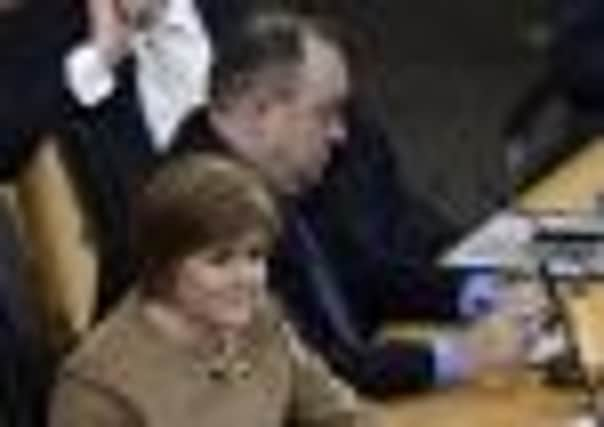Scottish independence: Another bruising day for SNP on Europe as it changes tack over talks


• Barroso’s opinion to be ‘treated seriously and with respect’, says Nicola Sturgeon
• Ms Sturgeon added: “The EC is not the final arbiter of these matters’
Advertisement
Hide AdAdvertisement
Hide Ad• Deputy First Minister has written to the European President seeking a meeting over an independent Scotland’s relationship with the EU


The Deputy First Minister made the concession on another bruising day for the SNP over Europe, which saw Ms Sturgeon admit talks would also have to be held on EU border controls and the single currency.
She insisted an independent Scotland would remain in the EU, saying members of the pact would recognise it was in their best interests.
But in a statement to MSPs, she outlined a dramatic shift in the Scottish Government’s stance on Europe in terms of the policy areas that would be up for negotiation. Previous statements have asserted that an independent Scotland would inherit exactly the same treaty rights and obligations as the rest of the UK.
Ms Sturgeon was asked specifically whether the rebate, currently worth £2.9 billion a year but expected to rise to £3.8bn in 2014-15, would be a “matter for negotiation”.
She replied: “In terms of the rebate, I would be confident of an independent Scottish Government negotiating a good deal for Scotland, which is something that UK governments have consistently failed to do.
“But I think in all seriousness, I think this is an issue in which Scotland and the UK would have a shared interest. Because … independence for Scotland means renegotiation of many of these matters for the UK as well. So we would work together to get the best deal.”
But her opponents said the SNP was putting at risk a payment that will be worth £135 a year to the average Scottish household by 2014-15.
Advertisement
Hide AdAdvertisement
Hide AdMs Sturgeon addressed MSPs in response to opposition demands for an emergency statement. The Conservatives called for such a statement after The Scotsman revealed a letter from European Commission president Jose Manuel Barroso indicated an independent Scotland would not get automatic EU membership, despite claims by the SNP to the contrary.
Ms Sturgeon told Holyrood she believed it would be in every other member state’s interest to find a way to make a smooth transition to full statehood for Scotland and that the practical politics of constitutional change would allow flexibility.
She said Mr Barroso’s opinion should be respected but did not constitute a ruling.
Neither was there any treaty provision to allow for the removal of part of an existing member state, which would, by definition, be full of EU citizens, she said.
“I am very deliberately relying not simply on arguments of law or process but on arguments of common sense, reality and mutual self-interest,” Ms Sturgeon said.
“The EU is an organisation that welcomes new members. It wants others to join. It most certainly would not want to see existing parts of its territory leave.”
Ms Sturgeon indicated talks would have to be held on currency arrangements and membership of the Schengen area, the European single travel and immigration area from which the UK has opted out.
“I believe that such a sensible process of negotiation will result in Scotland’s continuing membership of the EU on terms that are reasonable,” she said.
Advertisement
Hide AdAdvertisement
Hide Ad“By that, I mean, for example, that, just like Sweden, we would not join the euro until and unless it was in Scotland’s interests to do so and we had satisfied the conditions for doing so.
“And, just like Ireland, we would not enter Schengen, but instead would co-operate with Ireland and the rest of the UK in the common travel area.”
She went on: “Let me quote Mr Barroso, who said, ‘I see no country leaving, I see many countries wanting to join. The EU is an inherently flexible organisation. It adapts as it should to the changing circumstances of the member states’. To demonstrate that, we just have to look at how quickly the former East Germany was integrated into the EU following unification.”
Former Conservative leader Annabel Goldie called Ms Sturgeon’s statement “a triumph of optimism and evasiveness over hard-headed fact and reality”.
She added: “Most laughably of all, we are expected to believe that an independent Scotland will be in the same position as a bankrupt failed state like East Germany. That really will take some explaining to the people of Scotland.”
Patricia Ferguson, for Labour, said: “Today, in her statement, the Deputy First Minister simply talks about a vague intention to remain in the EU. First it was automatic, then we needed negotiations, then it was common sense and now it’s an intention. This looks like a humiliating capitulation, but so much of the statement was confused.”